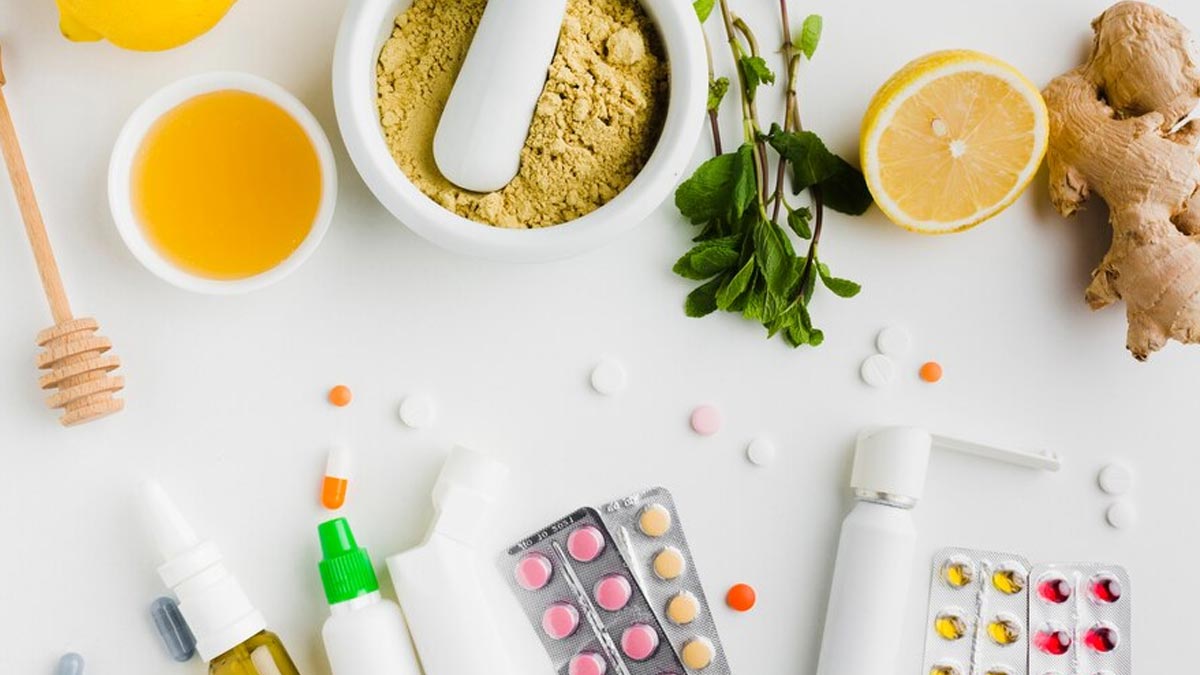
There comes a time when antibiotics seem like the answer to all your health problems. But it is crucial to understand that they only help treat bacterial infections, like strep throat and Urinary Tract Infections (UTIs) and should not be used irresponsibly for other forms of illnesses, like viral infections. Not only does it prove ineffective, but it also leads to antibiotic resistance, in which the bacteria develop the ability to dodge the drugs designed to kill them.
Table of Content:-
While antibiotics may seem like a part of modern medicine, their natural counterparts have existed since time immemorial. Speaking with the OnlyMyHealth team, Dr Joydeep Ghosh, Consultant, Internal Medicine, Fortis Hospital, Anandapur, described natural antibiotics as being derived from nature and not synthesised chemically. Five such natural sources of antibiotics are listed below:
Also Read: Intake Of Antibiotics: Expert Explains its Use and Misuse
Ginger

Ginger has shown potential in fighting bacteria, including those that cause periodontal diseases, according to a study published in Phytotherapy Research. These properties are attributed to compounds like gingerols and shogaols found in ginger, which are known to also fight various bacteria, including some common culprits like E. coli and Staphylococcus aureus.
Some of the common examples of E. coli infections include UTI, pneumonia, and meningitis, whereas Staphylococcus aureus can cause boils, furuncles, and cellulitis.
Garlic
Garlic is a common kitchen ingredient that might offer more than just culinary flavour. It has been shown to possess antibacterial properties that help prevent a wide range of bacterial infections. Some of the common compounds include allicin, ajoene, and allyl sulphide, which give garlic the power to keep bacteria at bay.
A 2011 study published in the journal Applied and Environmental Microbiology found that garlic extracts, specifically organosulfur compounds, can harm and inactivate the foodborne bacteria Campylobacter jejuni.
Clove

Cloves are known for their antimicrobial properties. Research suggests that they contain a compound called eugenol, which is said to hinder the growth of various bacteria, including S. aureus and E. coli. However, it's crucial to note that cloves, or any other natural antibiotics, shouldn't be relied upon as a primary treatment for bacterial infections.
Honey
Honey has been seen as a healthy source of various nutrients and antioxidant properties. It also has a long history of use as a natural antibiotic. This is because it is high in sugar content, which creates an inhospitable environment for bacteria, and contains hydrogen peroxide, which is rich in antibacterial properties and can ward off infections from Staphylococcus aureus and E. coli.
A study published in the Asian Pacific Journal of Tropical Biomedicine suggests that some honeys, like manuka honey, are effective even without hydrogen peroxide, attributing it to other mechanisms like low pH and high sugar content. Additionally, medical-grade honeys have shown promise against antibiotic-resistant bacteria in lab settings, the research notes.
Also Read: Expert Answers Whether It Is Safe To Add Honey In Warm Water
Myrrh
Myrrh, also known as guggul in India, is a gum-resin derived from a tree species called Commiphora genus, which belongs to the Burseraceae family. Studies have suggested that these contain strong antibacterial properties that protect against common bacteria.
In fact, a 2000 study published in Planta Medica found that myrrh extract can protect against several bacteria, including E. coli, Staphylococcus aureus, Pseudomonas aeruginosa, and Candida albicans.
Are Natural Antibiotics Effective?

According to Ayurveda, natural antibiotics are believed to be effective in specific conditions, such as skin infections, acting as antioxidants or immune boosters, and aiding in bacterial resistance against infection, said Dr Ghosh.
“In the past, when allopathy wasn't prevalent, people relied on these natural antibiotics and homemade remedies, which demonstrated effectiveness in treating wounds and infections. However, in allopathy, there is limited data on the efficacy of natural antibiotics,” he added.
Conclusion
Antibiotics are a great way to treat bacterial infections. However, they should only be taken under a doctor’s supervision. Similarly, it is also important to consult a doctor about taking natural antibiotics. Do not depend entirely on them, as severe bacterial infections may require advanced treatments.
Also watch this video
How we keep this article up to date:
We work with experts and keep a close eye on the latest in health and wellness. Whenever there is a new research or helpful information, we update our articles with accurate and useful advice.
Current Version